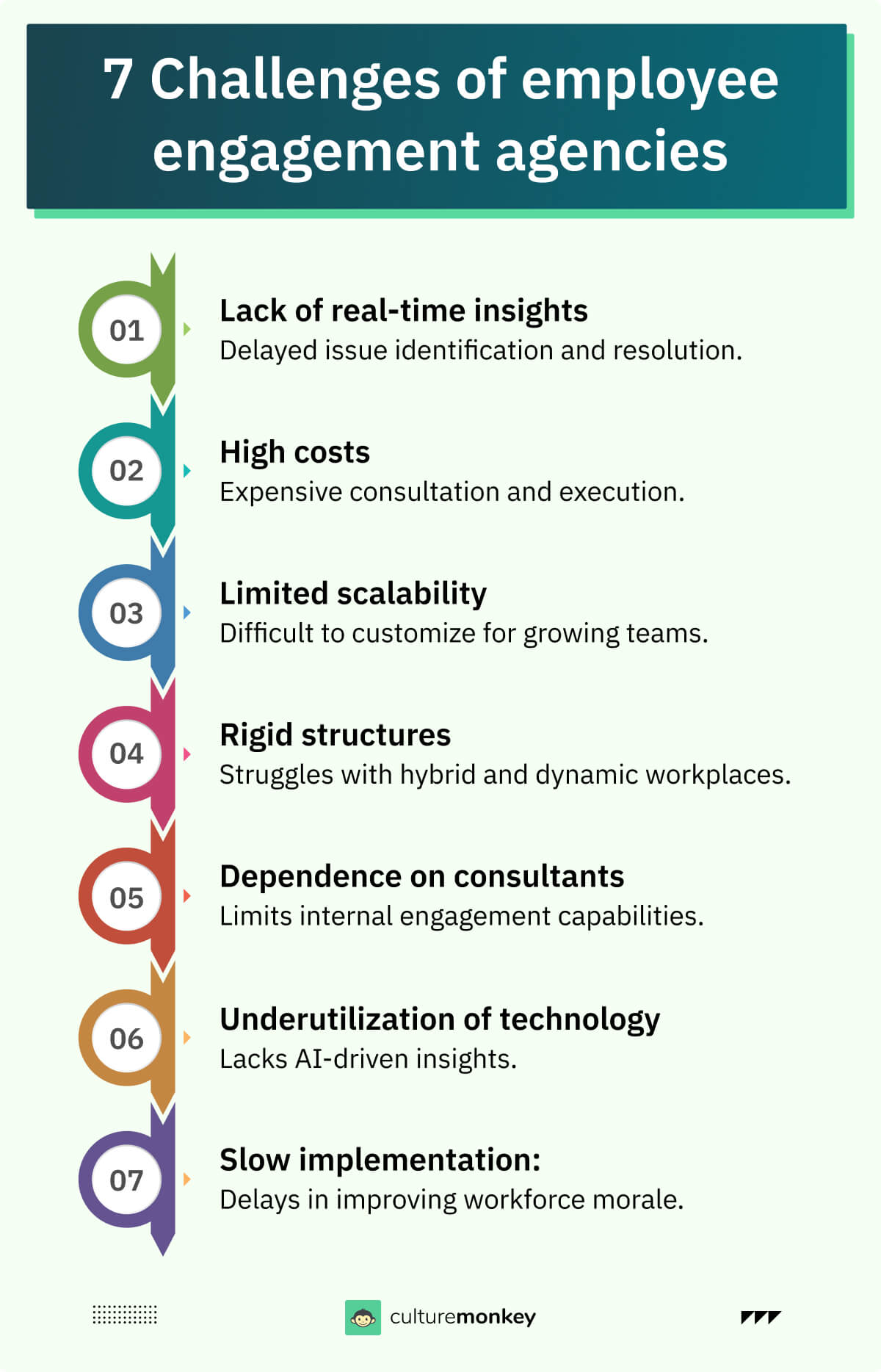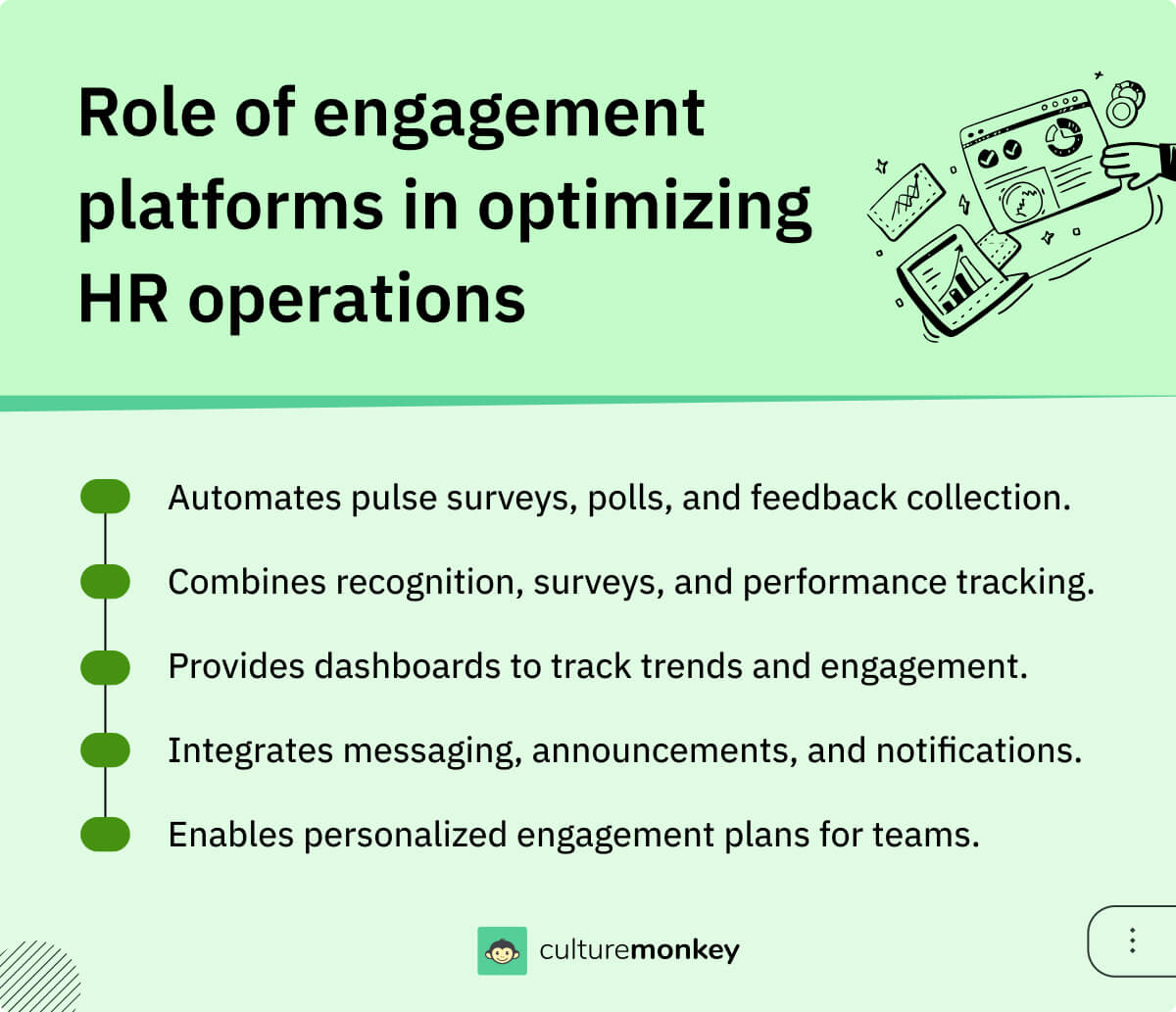Why the employee engagement agency model is giving way to modern engagement platforms

Remember those Friday nights at Blockbuster? You’d walk in with popcorn-level excitement, pacing through endless aisles, scanning VHS covers under flickering fluorescent lights. You’d pick a movie purely based on the cover, ask the teen at the counter if it was “any good,” and cross your fingers it wasn’t already rented out. It was a ritual—slow, hit-or-miss, but all we knew.
Then came Netflix. No lines, no late fees, and way better suggestions. Suddenly, movie night got smarter, faster, and tailored to you.
That same shift is happening in how companies approach engagement—moving away from the old-school employee engagement agency model and toward smarter, real-time solutions. HR leaders today don’t want to wait for next quarter’s report—they want insights now. Because true employee engagement starts with timely action, not delayed strategy.
In this blog, we’ll unpack why agencies aren’t always enough anymore—and what to look for instead.
Blog Highlights


What are employee engagement services?
Employee engagement services are specialized solutions designed to help organizations cultivate a motivated, satisfied, and high-performing workforce. These services focus on fostering a positive work environment by addressing key factors that influence employee morale and commitment. They provide organizations with the tools and strategies to build meaningful connections, improve employee retention rates, and drive business success.
Employee engagement services encompass a wide range of strategic initiatives tailored to improve workplace culture and align employees with organizational goals. They include conducting comprehensive surveys to gather employee feedback, implementing rewards and recognition programs, organizing team-building activities, and offering training sessions to enhance professional growth.
Additionally, these services provide expert consultation to identify engagement gaps and recommend actionable strategies to boost productivity and retention. By leveraging data-driven insights and personalized approaches, employee engagement services empower HR teams to address employee concerns proactively, reduce turnover, and create a thriving workplace. Whether through agencies or digital platforms, these services play a crucial role in building a culture of trust, collaboration, and continuous improvement.
What does an employee engagement agency do?

An employee engagement agency specializes in crafting workforce engagement strategies and initiatives to help organizations foster a motivated, productive, and satisfied workforce. These agencies leverage expertise in workplace culture and employee behavior to address challenges, boost morale, and enhance overall engagement. Here’s how they typically see clients add value:
- Developing engagement strategies: Employee engagement agencies design tailored strategies to align workplace goals with employee expectations. They analyze company culture and workforce dynamics to propose actionable plans that promote long-term engagement.
- Conducting employee surveys: These agencies conduct surveys to gauge employee sentiment and gather insights into workplace satisfaction. They analyze the data to identify areas for improvement and track engagement trends over time.



Employees are the heartbeat of a company. Regular surveys ensure you’re in tune with what they need to thrive.
Founder
Virgin Group
- Organizing team-building activities: From workshops to off-site retreats, engagement agencies plan and execute team-building events. These activities foster collaboration, improve communication, and strengthen team bonds within the organization.
- Providing training and development programs: Agencies offer training programs to upskill employees and leadership teams. These initiatives enhance personal growth, job satisfaction, and alignment with organizational goals.
- Offering expert consultation: Employee engagement consultancies guide companies in resolving complex engagement challenges. They provide expert recommendations for creating a culture of recognition, inclusion, and trust.
Types of employee engagement services offered by an agency
Employee engagement services are designed to support organizations in fostering a thriving workplace culture and enhancing employee satisfaction. These services focus on various aspects of internal communication, change management, leadership development, and company culture..
- Internal & leader communications: Effective communication is key to a connected workforce. Employee engagement agencies provide strategies for channels, content, and storytelling to enhance employee experiences. From companywide meetings to global events, these services help build engaged communities across all levels, from executives to frontline employees.
- Change management: Organizational changes like mergers, leadership transitions, and restructures can impact employee morale. Agencies offer comprehensive change-management strategies that combine business goals with empathy-driven communications to build trust and create a sense of stability within the workforce.
- Keynotes and workshops: Engaging keynotes and interactive workshops equip employees and leaders with the skills and inspiration needed to drive engagement. These sessions focus on fostering motivation, collaboration, and a deeper understanding of company values and goals.
- Employer reputation: Building a strong employer brand is crucial for attracting and retaining top talent. Employee engagement services enhance employer reputation through strategic storytelling, employee advocacy programs, and external communications that reflect a positive workplace culture.
- Culture development: A thriving company culture fosters collaboration, innovation, and employee loyalty. Engagement services support organizations in developing and sustaining a culture that aligns with company values, promotes inclusivity, and enhances overall employee experience. An employee recognition agency plays a vital role in shaping a workplace culture that drives long-term success.
What is an employee engagement platform?

An employee engagement platform is a digital solution designed to foster connection, motivation, and productivity within a workforce. It centralizes tools and features that support communication, feedback, recognition, and performance management, making it easier for organizations to nurture a positive workplace culture. Unlike traditional methods, these platforms provide real-time insights to drive data-driven engagement strategies.
These platforms serve as a hub for activities that improve employee experience and satisfaction. From conducting pulse surveys to gathering instant feedback, they allow HR teams to assess engagement levels quickly and effectively. Additionally, they enable peer-to-peer recognition and gamified rewards systems, promoting a culture of appreciation, accountability, and camaraderie among employees.
One of the standout benefits of employee engagement platforms is their ability to integrate with existing workplace tools. Seamless connectivity with project management software, communication apps, and HR systems ensures that engagement efforts are embedded into daily business workflows rather than feeling like add-ons.
For HR professionals, when it comes to employee engagement in HR, these platforms provide powerful analytics dashboards that highlight trends, pinpoint areas of concern,and create, and suggest actionable solutions. They replace the manual processes often associated with employee engagement services, empowering leaders to make proactive decisions.
Challenges of employee engagement agencies

Employee engagement agencies often face limitations in meeting the dynamic needs of modern workplaces. As organizations shift toward real-time insights and digital-first solutions, the traditional methods used by these agencies are proving less effective. Here are the key challenges they encounter:
- Limited real-time insights: Agencies often rely on periodic surveys and reports, which can delay identifying and addressing engagement issues. This lack of immediacy hinders their ability to respond proactively to workforce concerns.
- High costs: Hiring an employee engagement agency involves significant expenses for consultation, custom strategies, and program execution. These costs can be prohibitive, especially for small to mid-sized organizations.
- Difficulty in scaling solutions: Agencies may struggle to scale their employee engagement initiatives to accommodate rapidly growing or global organizations. Customizing strategies for diverse teams across locations becomes time-intensive and resource-heavy.
- Inflexibility in dynamic work environments: Traditional engagement services lack the agility needed to adapt to changing organizational structures or hybrid work models. This rigidity can render their solutions ineffective in addressing current workplace challenges.
- Dependency on external expertise: Relying heavily on external consultants can prevent organizations from building internal capabilities for sustained engagement efforts. This creates a long-term dependency on the agency.
- Limited use of technology: Agencies often underutilize advanced tools like AI-driven analytics or integration platforms such as Agency Analytics competitors. This limits their ability to provide actionable, data-backed recommendations.
- Time-consuming processes: The planning and execution of engagement initiatives by an external engagement strategy agency can be slow, causing delays in addressing immediate employee needs or improving morale effectively.
Red flags to watch out for when evaluating vendors
Choosing the right partner for your employee engagement needs isn’t just about flashy tools or polished presentations. It’s about finding a vendor that truly understands your workforce dynamics and aligns with your long-term goals.
Here are five specific red flags to watch for when evaluating an engagement agency:
- No industry-specific expertise: If a vendor lacks experience working with companies in your sector or region, especially if they claim to be a global employee engagement agency, be cautious. Solutions must reflect the nuances of your workforce—not generic employee engagement models applied across industries.
- Limited access to data and transparency: Avoid vendors who offer surface-level insights or don’t provide real-time analytics. An effective engagement strategy agency should empower you with data dashboards, not lock you into waiting for monthly reports.
- One-size-fits-all frameworks: When an employee engagement company offers templated strategies with little room for customization, it signals a lack of strategic depth. Your people and culture are unique, your solutions should be too.
- No roadmap for internal ownership: Vendors that create dependence rather than building internal capability are a risk. A good partner guides your HR team to self-sufficiency.
- Inflexibility in evolving needs: If the agency can’t adapt strategies for hybrid, remote, or rapidly scaling teams, they’re not built for today’s dynamic workplace environment.
In-house engagement team vs. External agency
Organizations aiming to increase employee engagement often face a key decision: build an internal team or partner with an external agency. Each approach offers unique advantages depending on company size, culture, and goals. Here’s a side-by-side comparison to help you evaluate what fits best:
| Factor | In House Engagement Team | External Agency |
|---|---|---|
| Cultural alignment | Deep understanding of your people, values, and day-to-day realities. | Requires time to learn your culture and may still miss key nuances. |
| Agility | Can adapt quickly to shifting needs and priorities. | Often tied to fixed scopes and slower to pivot. |
| Ownership of strategy | Direct control over the employee engagement model and execution. | Relies on outsourced expertise, limiting internal growth. |
| Cost efficiency | Higher ROI over time by building sustainable internal capabilities. | Ongoing consultancy fees and expensive retainer models. |
| Trust and transparency | Builds stronger employee partnership through consistent, familiar voices. | Seen as outsiders, which may impact employee trust. |
| Data accessibility | Real-time access to feedback and analytics for immediate action. | May delay reporting or limit access to raw data. |
Questions to ask before hiring an employee engagement agency
Hiring an employee engagement agency can be a game-changer—but only if you ask the right questions upfront. These questions help ensure the agency understands your goals and can deliver a meaningful, measurable impact.
Here are six essential questions to ask before making a decision:
- What is your experience with companies of our size and industry?: Every workplace is different. Ensure the agency has experience with similar organizations and can tailor strategies that suit your specific culture and structure.
- How do you measure engagement success?: A credible employee experience agency should offer clear, data-driven KPIs and benchmarks—not just qualitative feedback.
- Can you provide real-world case studies and client references?: Ask for examples of successful outcomes and contactable references to validate their approach and results.
- How do you tailor strategies to our business goals?: Avoid one-size-fits-all solutions. The agency should co-create initiatives aligned with your company’s vision and workforce challenges.
- What level of involvement is expected from our internal team?: Understand what support you’ll need to provide to make the engagement effective, from logistics to leadership alignment.
- How will your agency support us after implementation?: Ongoing support matters. Clarify if the agency offers long-term guidance, periodic reviews, or hands-on execution post-launch.
How engagement platforms are replacing agencies?
With the rise of technology, engagement platforms are transforming how organizations connect with their workforce. Unlike traditional agencies, platforms offer real-time, data-driven communications solutions that are scalable, cost-effective, and easier to integrate. This shift is rapidly reshaping the employee engagement landscape.
- Real-time insights and analytics: Engagement platforms provide instant feedback through tools like pulse surveys and analytics dashboards. This immediacy helps organizations identify and address employee concerns faster than agencies can.
- Cost-effectiveness: Platforms eliminate the recurring expenses associated with hiring agencies, offering subscription-based models that are affordable and scalable for businesses of all sizes.
- Ease of integration: These employee survey platforms seamlessly integrate with workplace tools like communication apps, project management systems, and HR software. This makes engagement initiatives part of daily workflows, unlike agency-driven external programs.
- Scalability across global teams: Engagement platforms cater to diverse and dispersed teams with multilingual support and flexible features. Agencies often struggle to match this scalability and inclusivity.
- Autonomy for HR teams: HR professionals gain direct control over engagement efforts through platforms. Unlike agencies, which require back-and-forth communication, platforms empower HR to implement strategies independently.
- Personalization and adaptability: Platforms use AI and advanced algorithms to deliver tailored recommendations, ensuring strategies evolve with the organization’s changing needs. Agencies rely on Manual customization, which is slower and less adaptable.
Benefits of using employee engagement platforms

Employee engagement platforms have revolutionized how companies foster workplace connections and drive motivation. By combining advanced technology with user-friendly interfaces, they simplify engagement processes while delivering real-time value. Here are the Key benefits these platforms bring to modern workplaces:
- Improved employee recognition: Engagement platforms feature peer-to-peer recognition systems and gamified rewards programs. These initiatives boost morale by celebrating achievements and fostering a culture of appreciation.
- Enhanced decision-making through analytics: Advanced analytics dashboards provide actionable insights into engagement trends. HR leaders can use this data to implement targeted strategies that directly address employee needs.
- Customizable solutions for diverse workforces: With features like multilingual support and personalized dashboards, platforms cater to diverse teams and adapt to unique organizational needs.
- Scalable for growing organizations: As companies expand, platforms can scale effortlessly to accommodate new employees and changing structures, ensuring engagement remains consistent and effective.
How does HR’s role in employee engagement become easier with engagement platforms?

Engagement platforms simplify and enhance HR’s ability to connect with employees, address concerns, and foster a positive workplace culture. By automating repetitive tasks and offering real-time insights, these platforms free HR teams to focus on strategic engagement initiatives. Here’s how they make the process easier:
Streamlined feedback collection
Engagement platforms automate the process of collecting employee feedback through pulse surveys, polls, and suggestion boxes. This reduces the burden of Manual data gathering and ensures that HR has access to consistent and actionable insights from engaged employees. It allows them to stay informed about employee sentiment in real time.
Centralized engagement tools
These platforms integrate various engagement tools like recognition programs, surveys, and performance tracking into a unified Interface. This eliminates the need for multiple disconnected systems, making it easier for HR to manage engagement efforts efficiently. A centralized platform reduces administrative overhead and enhances workflow.
Actionable insights through analytics
Engagement platforms provide advanced analytics dashboards that highlight trends and engagement levels across teams. HR teams can use these insights to identify problem areas, implement targeted solutions, and measure the effectiveness of their initiatives. This data-driven approach leads to more informed decision-making.
Improved communication channels
Platforms enhance workplace communication by integrating tools for instant messaging, announcements, and notifications. This ensures HR can communicate updates or gather input quickly and transparently, fostering a sense of trust and inclusivity within the organization.
Personalized engagement initiatives
HR teams can leverage platform features to create tailored engagement plans based on department-specific needs, employee demographic, and behaviors, or organizational goals. This personalization ensures that all employees feel valued and connected, leading to stronger engagement and improved job satisfaction.
Transitioning from an employee engagement agency to a platform

Shifting from an employee engagement agency to a digital platform requires a thoughtful approach to ensure a smooth transition. By carefully planning and involving stakeholders, organizations can maximize the benefits of this shift while minimizing disruptions. Here are the six essential steps:
- Assess organizational needs: Begin by evaluating your current engagement goals and challenges. Identify the gaps in your agency-driven approach and determine how a platform can address these needs effectively.
- Research and select the right platform: Explore various engagement platforms, comparing features, scalability, and integration capabilities. Choose a platform that aligns with your organization’s size, culture, and engagement objectives.
- Plan the transition timeline: Develop a step-by-step implementation plan, including key milestones and deadlines. Ensure the timeline allows for testing, employee onboarding, and adjustments to avoid disruption.
- Train your HR and leadership teams: Provide comprehensive training for HR and leaders on using the platform’s features. Familiarize them with tools like analytics dashboards, feedback systems, and communication modules to maximize effectiveness.
- Gradually onboard employees: Introduce the platform to employees in phases, starting with smaller teams. Gather feedback during the onboarding process and refine the rollout strategy based on their input.
- Monitor and optimize: Continuously track the platform’s performance through built-in analytics. Use the data to tweak engagement initiatives, ensuring they meet your organizational goals and improve employee satisfaction.

Simplify Your Employee Engagement Platform Selection
Choose the right engagement platform to boost productivity, retention, and employee satisfaction effortlessly.
Switching from agencies to platforms: What HR leaders need to know
When you transition from relying on an employee engagement group to manage your workplace engagement to a modern digital platform, you unlock greater efficiency, cost savings, and real-time data-driven decision-making.
Switching to an engagement platform requires HR leaders to assess their organization's unique needs and align them with the capabilities of a platform. They must consider factors such as scalability, ease of integration with existing HR tools, and the level of automation offered.



The secret to thriving workplaces isn’t just engagement, it’s making sure every employee’s voice is heard through continuous feedback.
Founder and CEO
Thrive Global
Unlike agencies, platforms provide real-time insights and enable HR teams to take immediate action based on employee feedback. HR leaders should also focus on change management by ensuring employees and managers are adequately trained to utilize the platform effectively.
Clear communication about the benefits of the transition is crucial to gain buy-in across the organization. Additionally, evaluating data security, compliance features, and long-term support options will help in making a smooth transition while maintaining trust and engagement within the workforce.
Conclusion
The way organizations think about engagement is evolving—and fast. Relying solely on a traditional employee engagement agency may no longer be enough in today’s dynamic, distributed, and data-driven work environments. While agencies can offer strategic insights and one-on-one guidance, they often lack the speed, flexibility, and real-time responsiveness modern HR teams need.
After all, employee engagement starts with being able to listen and act—right when it matters most. CultureMonkey redefines how modern engagement gets done. As a powerful, all-in-one employee engagement platform, CultureMonkey helps you go beyond outdated, consultant-heavy models.
From customizable employee engagement surveys and real-time feedback analytics to action-ready reports and automated workflows, CultureMonkey enables HR leaders to pinpoint exactly what’s driving engagement—and where support is needed. Whether you’re looking to improve employee engagement levels, enhance workplace culture, or build a lasting sense of connection, CultureMonkey gives you the tools to do it quickly and at scale.
So, if you're ready to move from reactive to proactive and create a culture that listens, adapts, and grows—CultureMonkey is your partner in making it happen. Discover how CultureMonkey can help your organization build a more engaged and satisfied workforce today.
Summary
The traditional employee engagement agency model is being replaced by modern engagement platforms that offer real-time insights, automation, and scalability. Agencies rely on periodic reports, manual processes, and external consultants, making them slow and costly.
In contrast, engagement platforms provide instant analytics, seamless integration, and greater control for HR teams. This shift enables organizations to enhance employee experiences, boost efficiency, and drive long-term engagement more effectively.
FAQs
1. What are the cost differences between engagement platforms and agencies?
Engagement platforms generally offer customers more cost-effective solutions with subscription-based pricing, eliminating the need for high consultancy fees that come with agencies. Platforms streamline engagement efforts, reducing long-term expenses while offering scalability. Agencies, on the other hand, often come with higher upfront and ongoing costs for custom solutions and consultations, making them less affordable for many organizations.
2. Can engagement platforms provide better insights than agencies?
Yes, engagement platforms provide real-time, data-driven insights through analytics dashboards. Unlike agencies, which rely on periodic surveys and reports, platforms allow HR teams to monitor engagement continuously, identify trends, and act on feedback instantly. This level of insight and immediacy leads to more proactive, informed decision-making and a deeper understanding of employee sentiment, enhancing overall engagement strategies.
3. What features should I look for in an employee engagement platform?
Look for features like real-time feedback collection, customizable surveys, analytics dashboards, and integration with existing HR tools. Platforms should also offer employee recognition, reporting tools, and personalization options. Security and data privacy features are also crucial, ensuring sensitive employee information is protected. A user-friendly interface and scalability are essential for supporting both small teams and large organizations.
4. Are engagement platforms suitable for small and medium businesses?
Yes, engagement platforms are highly suitable for small and medium businesses (SMBs) as they offer scalable, cost-effective solutions. Many platforms provide flexible pricing models and intuitive features that cater to organizations with limited resources. SMBs can use these platforms to gather real-time feedback, improve employee engagement, and make data-backed decisions without the high costs of traditional engagement agencies.
5. How do engagement platforms handle data privacy compared to agencies?
Engagement platforms typically adhere to strict data privacy standards, with features like encryption, user consent management, and compliance with regulations like GDPR. Since platforms operate digitally, they often have more robust security protocols than traditional agencies. Agencies may handle data manually, increasing the risk of breaches, while platforms automate and secure data storage, ensuring sensitive information is protected.
6. What is the difference between employee engagement and employee branding?
Employee engagement focuses on improving workforce motivation, satisfaction, and connection through employee engagement programs like feedback surveys and development programs. Employee engagement enhances internal culture, while employee branding shapes the organization’s public image to attract top talent. While engagement drives internal commitment, branding influences how the organization is perceived externally by potential candidates and stakeholders.
7. What is an employee engagement company?
An employee engagement company helps organizations enhance their workplace culture and improve employee satisfaction through tailored strategies. They offer services like surveys, recognition programs, and leadership training to align employee goals with business objectives.By leveraging data-driven insights, these companies empower businesses to proactively address challenges and foster a more engaged and productive workforce.
8. What’s the difference between an HR consultancy and an engagement agency?
An HR consultancy focuses on broad HR functions like hiring, compliance, and policies. An engagement agency specializes in programs that drive employee engagement, such as strategy design, culture initiatives, and employee engagement surveys. Engagement agencies focus on why employee engagement is important for retention, performance, and workplace satisfaction, offering targeted solutions beyond general HR support.
9. How much does it cost to hire an employee engagement agency?
Hiring an employee engagement agency typically costs between $10,000 to $100,000+ per year, depending on company size and service scope. Some include employee engagement software, tailored strategies based on an employee engagement model, and focus on key employee engagement drivers to improve employee engagement levels and overall workforce satisfaction through data-backed, strategic programs.




